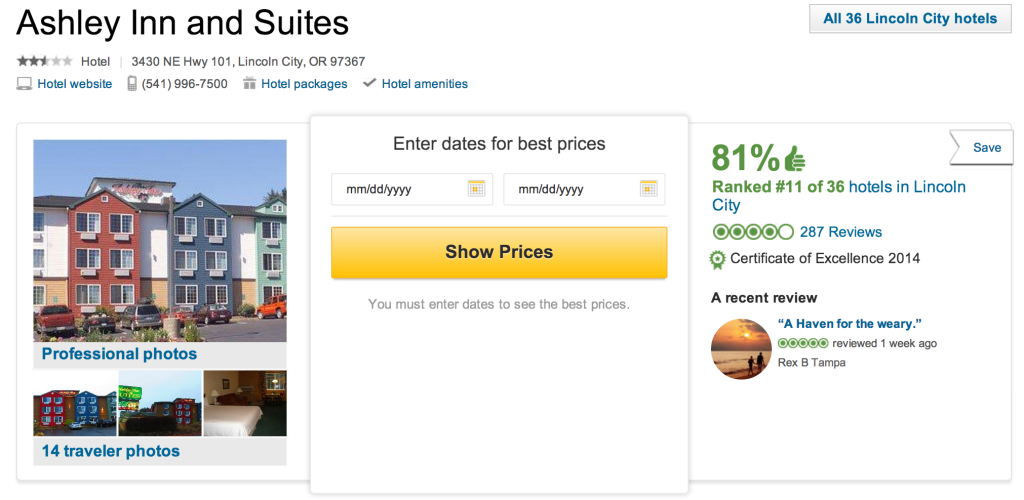It seems there are always lawsuits about something. After being in Europe for a year, I had forgotten already how often people can and do sue over things that you would never have thought about otherwise. I had asked my friends in Greece about suing people for this and that (not that I wanted to but was curious about people suing) and they looked at me like I was crazy for even thinking that. 🙂
Lawsuit Against A TripAdvisor Reviewer?
Here is one that strikes me as curious – a lawsuit against a TripAdvisor reviewer for defamation. It has been filed by the property that the reviewer had commented against, the Ashley Inn in Lincoln City, Oregon. The reviewer had some very harsh words about the property and its staff. I am not making a statement for or against either party (because I do not know enough to comment knowledgeably and who really cares what my opinion is? 🙂 ) Some of the comments made in the review accused hotel staff of being high or drunk and that the food and rooms were nasty. The lawsuit is for $74,500 for defamation damages and is being filed against the anonymus TripAdvisor user with the intent of putting the real person behind the username on the suit when they are found.
Obviously, these review sites can and should be used to provide accurate information and perspective about the quality of the rooms, service, and the treatment by the staff. I love referring to TripAdvisor to get a sense of what to expect at a property before booking or visiting. At the same time, I know that there are some reviews that are entirely puff pieces for the property and some that are written in a total negative light because they may not be used to staying at that particular level of hotel and have misguided expectations. In other words, I know to take everything I read there with more than a few grains of salt. But it is still a helpful forum to use to get an accurate barometer of the worthwhile nature of a property. But, if properties are allowed to start filing suit when they feel a review is too negative (or, in this case, they feel it is full of lies), will that prevent some reviewers from sharing an honest review of their experience when it was really negative? I am not a lawyer, but it should be interesting to see how this case turns out. Apparently, Oregon courts have already sided with business against internet reviewer, so who knows how it will work out.
Would a successful suit of this nature make you less likely to write a negative review of a property? Or would you simply use more generic words to describe your experience?











I am a lawyer and dont’ find this case interesting at all. This was not a “bad review” as you refer to it. The reviewer was alleging illegal drug use by certain individuals. This case has no bearing whatsoever to the subject of leaving a negative review on a website about your opinions and experiences. You can state whatever opinions you want about how you liked something or your impression of the quality. As soon as you state “factual” things (particularly about an individual) and those things fall into certain categories (such as drug use), you open yourself up to this.
I appreciate the expert viewpoint, David. With the other instance from March and this one, does this setup anything different for reviewers or open people up more than they may have been before?
Eta: I went back to check my description of it and I had not said it was a “bad review”.
As a business owner who gets online reviews (not TripAdvisor as we’re nothing to do with travel, but a well-known other reviewing site) we generally get very good and fair reviews. However, about a year ago we got a series of bad reviews (some containing minor factual errors which merely demonstrated that the person was making things up) from a series of users who had no previous posting experience. Our rating fell from 5* to 3*. The reviewers did not respond to our overtures and we took the matter up with the website. To cut a long story short, ultimately the reviews were removed because it was felt by the site that they emanated from the same source, which was probably a competitor.
It did not occur to me to sue but, thinking about it now, a chunk of punitive damages would be what this person deserved.
[…] Lincoln City hotel sues for defamation after anonymous person posts scathing TripAdvisor review. Last time I wrote on TripAdvisor in the courts, it was against the website (See TripAdvisor Wins “Dirtiest Lawsuit in America”). But this lawsuit goes after the actual reviewer “12Kelly” for defamation. See more from Running With Miles here. […]
I didn’t mean the quotes in “bad review” to be a quote from you but just an indication that this case involves far more than that. I don’t think either case changes anything. Different states also have different laws on defamation. If you read the articles, CA provides far more protection than Oregon. But what it comes down to is that while your opinion is protected, if you make a derogatory statement of fact, you risk a lawsuit. Now, if you’re telling the truth, that’s an absolute defense. This case to me is a lot clearer than the March one (but I’m basing that on the descriptions of the reviews). But even in the March one, if for example, there’s a contract that says what time the party ends and in fact the venue did not kick people out early, they could make an argument that the false statement harmed them. You cannot lie about a business without expecting repercussions. But say you thought the room was ugly, food tasted bad, service was sub-par, not attentive . . . will be protected. As a final note, remember anyone can sue anyone at any time. Allowing a suit to go forward just means that the judge is saying, “if everything you say is true, you have a case”. But in a defamation action, the person alleging defamation will have the burden of proof. So a simple “he said/she said” will likely not make it far. If statements are of the nature that they can’t be “proven”, case likely won’t make it past the judge.
[…] Running with miles shared a lawsuit about a negative tripadvisor review […]